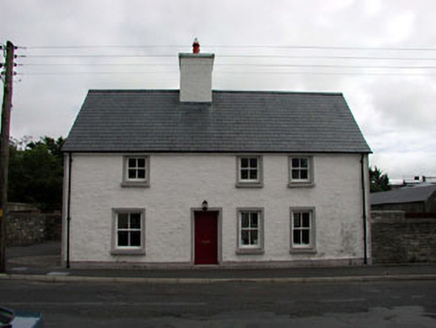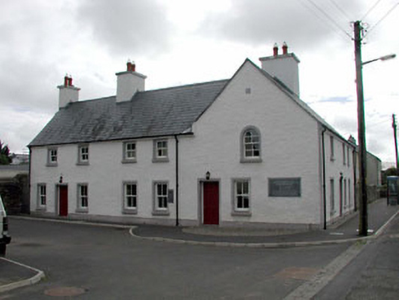Survey Data
Reg No
11822015
Rating
Regional
Categories of Special Interest
Architectural, Historical, Social
Original Use
House
In Use As
Library/archive
Date
1785 - 1795
Coordinates
279577, 196075
Date Recorded
--/--/--
Date Updated
--/--/--
Description
Detached four-bay two-storey house, c.1790, on a corner site on a U-shaped plan with single-bay two-storey side elevation to west and five-bay two-storey return to rear to north (possibly incorporating separate three-bay two-storey house to north) with single-bay single-storey projecting bay with dormer attic to north-east. Subsequently in use as post office. Extensively renovated, 1999. Now in use as library. Gable-ended roof with slate. Clay ridge tiles. Roughcast chimney stacks. Replacement aluminium rainwater goods, c.1980, on eaves course. Roughcast walls. Painted. Cut-stone plaque. Square-headed window openings (round-headed window opening to first floor side elevation to west). Stone sills. Rendered surrounds. Replacement 2/2 timber sash windows, 1999. Square-headed door openings. Rendered surrounds. Replacement timber panelled doors, 1999. Road fronted on a corner site. Tarmacadam footpath to front.
Appraisal
This house, which has been sympathetically renovated in the late twentieth century, is of considerable social and historical interest for its associations with Mary Leadbeater, a member of the Shakleton family who operated a post office in the building and who wrote the ‘Annals of Ballitore’, a history of the establishment of the Quaker village (the only planned and permanent Quaker settlement in the country). The composition of the building with irregularly displaced proportions is typical of the informal, unsophisticated tone of the building stock of the historic core of Ballitore. During renovations, replacement materials have been installed in keeping with the original form of the building, including traditional style timber sash fenestration. The house is a prominent and attractive landmark in the centre of Ballitore, framing the ‘square’ to the east.



